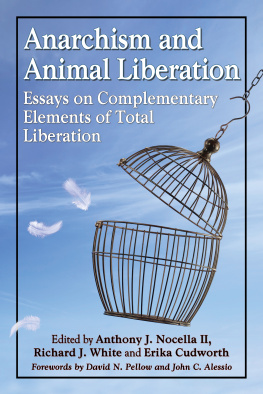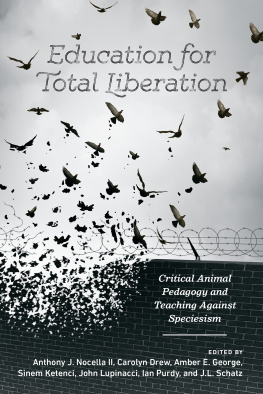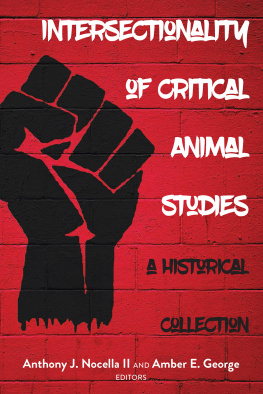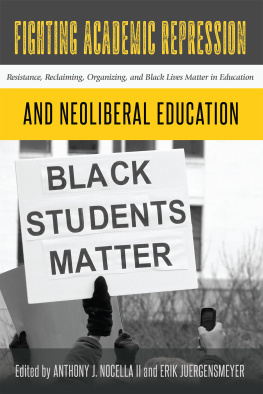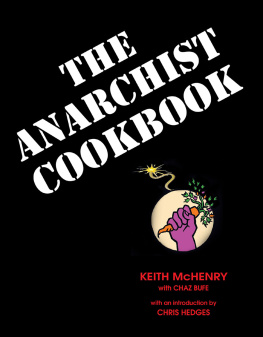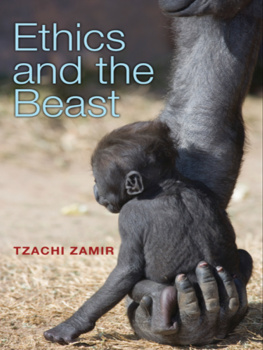
Anarchism and Animal Liberation
Essays on Complementary Elements of Total Liberation
Edited by Anthony J. Nocella II, Richard J. White and Erika Cudworth
Forewords by David N. Pellow and John C. Alessio

McFarland & Company, Inc., Publishers
Jefferson, North Carolina
LIBRARY OF CONGRESS CATALOGUING DATA ARE AVAILABLE
BRITISH LIBRARY CATALOGUING DATA ARE AVAILABLE
e-ISBN: 978-1-4766-2132-6
2015 Anthony J. Nocella II, Richard J. White and Erika Cudworth. All rights reserved
No part of this book may be reproduced or transmitted in any form or by any means, electronic or mechanical, including photocopying or recording, or by any information storage and retrieval system, without permission in writing from the publisher.
Cover image: George Tsartsianidis/Thinkstock
McFarland & Company, Inc., Publishers
Box 611, Jefferson, North Carolina 28640
www.mcfarlandpub.com
To all those who continue to struggle against
supremacy, oppression and domination.
Acknowledgments
Anthony, Richard and Erika would like to thank everyone who assisted in the production and publishing of this book. Special mention must go to David N. Pellow and John C. Alessio for each writing a foreword for the book and, of course, to the contributors of the bookBrian Dominick, Drew Robert Winter, Will Boisseau, Jim Donaghey, Nekeisha Alayna Alexis, Mara J. Pfeffer, Sean Parson, Lara Drew, Kim Socha, John Lupinacci and Aragorn Eloff. Our thanks to Sarat Colling, Reyna Crow, Carrie Freeman, Ruth Kinna, Joel Helfrich, Peter McLaren, Nick Ryan, John Sorenson and Tanya Loughead for their first reviews of the book. We would also like to thank the Institute for Critical Animal Studies for supporting this book. More generally, we are indebted to all those whothrough their work and their activismcontinue to expand the horizons of the field of Critical Animal Studies. Finally we would also like to thank our inter-species families and friends for their love and support. We hope that this book helps to bring a more socially just and peaceable future into being for them, for all.
Foreword
David N. Pellow
Ashanti Alston, a former Black Panther and Black Liberation Army activist and one-time political prisoner, once told me, I really feel like of all the groups, the anarchist mindset is open to understanding all the different oppressions. I concur and I share Alstons perspective because, like him, I also identify as an anarchist person of color and I see evidence every day of my life that anarchisms core principles and promises make a lot of sense to those of us who are committed to total liberationideas, scholarship, artistic expression, and action aimed at challenging all forms of oppression. To my knowledge Anarchism and Animal Liberation is the first book to place anarchist studies and Critical Animal Studies in conversation with one another, and for that reason alone, this is a path-breaking work.
In so many ways, the essays in this book focus on expanding our understanding of hierarchy and inequality by making sense of the often tense and violent relationships among humans and nonhuman animal species. In so doing, the editors and contributors facilitate the goal of achieving a better grasp of inequalitys ramifications while also deepening our understanding of the nature of inequality itself. Only then can we truly grasp the depths of our socioecological crises and address them effectively.
As a sociologist I must confront the most basic yet profound questions raised in this book: what is inequality and why does it matter? At its most basic level, inequality means that if you are on top of a social system, or higher on a social status ladder when compared with another being, then you possess or have access to more resources, wealth, and privileges. But more importantlyand from the standpoint of anarchist studies and Critical Animal Studiesyour elevated position above others also means that your life is of greater value than others living within that social system. You likely own or control and affect more of the planet and its constituent residents and life support systems than others, you likely own or control and affect more living beings (and, therefore, likely produce more death) than others, and you control and benefit from the ideational systems that give meaning and legitimacy to such dynamics. Inequality is a means of ordering the human and nonhuman worlds for the relative benefit of some and to the detriment of others. Anarchist studies and Critical Animal Studies explore the origins and consequences of varied forms of inequality and hierarchy, and resolve to oppose them at every level.
Public health scholarship reveals that human life expectancy, morbidity, mortality, and wellbeing are highly correlated with key measures of inequality. In the case of environmental inequality and environmental racism, working class people, people of color, women, immigrants, and Indigenous persons are more likely to face health risks as a result of the uneven exposure to environmental harm that social and institutional forces routinely perpetrate (practices that are rooted in multiple forms of social inequality and hierarchy). Thus social or human inequalities derive their existence through inequalities that also divide, rank, and exert control over nonhumans and ecosystems. Inequality is, above all, unnatural in the sense that it does not just happenit requires a great deal of energy, labor, and institutional effort to produce and maintain unequal societies. This point is crucial because there is often a great deal of energy invested into making inequalities appear to be a natural state of affairs. As ecofeminist Greta Gaard writes, Appeals to nature have often been used to justify social norms, to the detriment of women, nature, queers, and persons of color. Inequality is not just an imbalance of resources or power, but is frequently experienced as unearned privileges made possible by domination and injustice. Those who suffer its consequences also routinely resist inequality. This book is a clarion call to solidarity and a call to join those who are leading these resistance efforts.
Anarchism and Animal Liberation embraces the idea, vision, and practice of total liberation, which views inequality as a threat to life itselffor oppressed peoples, species, and ecosystemsand is organized around the struggle for justice for all life forms. Individuals, collectives, organizations, networks, and movements seeking total liberation organize and mobilize in favor of symbols, metaphors, language, signs, representations, practices, and structures of equality and justice to do what social movements have always done: to imagine and create a better world. Only this world would be based on the idea that inequality and unfreedom in all their known manifestations should be eradicated.
The editors and contributors to this invaluable collection contend that one cannot fully grasp the foundations of racism, classism, sexism, patriarchy, ageism, and ableism without also understanding speciesism and dominionism because they are all ideologies and practices rooted in hierarchy and the creation of oppositional superior and inferior subjects. This total liberation framework links oppression and privileges across species, ecosystems, and human populations, suggesting a theory and path toward justice and freedomsomething missing in traditional models of intersectionality. Thus the concept of total liberation reveals both the complexity of various systems of hierarchy while also suggesting points of intervention, transformative change, solidarity and coalition building across myriad boundaries. Total liberation is, above all, a
Next page
